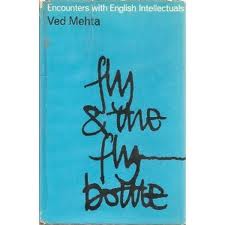 Review of 1960s British thinkers as presented ZOG Ved Mehta: Fly and the Fly-Bottle: Encounters with British Intellectuals
Review of 1960s British thinkers as presented ZOG Ved Mehta: Fly and the Fly-Bottle: Encounters with British Intellectuals Indian writer talks with and quotes philosophers and historians in Europe 1961-1962, 12 Oct 2010
Indian writer talks with and quotes philosophers and historians in Europe 1961-1962, 12 Oct 2010
The 'New Yorker' employed Ved Mehta, aged about 26, and (presumably) funded him to visit Europe, including Britain and Holland, in 1961 and 1962. I hesitate to call him a 'New Yorker writer', since he was redespatched to the old world very soon after being taken on. He'd read history at Oxford, and I think because of that must have been sent to cover some coincidental events—disputes over A J P Taylor's 'Origins of the Second World War', and disputes over Ernest Gellner's 'Words and Things' in which Gellner was supported by Bertrand Russell against 'linguistic philosophers' mostly from 1950s Oxford. While there he called on Arnold J. Toynbee, who'd just finished his 'Study of History', and on E H Carr (who'd just written 'What is History?' and was a third through his history of Soviet Russia, proving that he didn't know), and Herbert Butterfield (best known for believing science depended on Christianity), and others.
The full line-up is: Gilbert Ryle, Ernest Gellner, Bertrand Russell, Richard Hare, A J Ayer, P F Strawson, Iris Murdoch, G J Warnock, Stuart Hampshire, Hugh Trevor-Roper [=Lord Dacre], A J P Taylor, Toynbee, Pieter Geyl, E H Carr, C V Wedgwood, Christopher Hill, John Brooke, Herbert Butterfield. There are recently dead men off-stage, such as Sir Lewis Namier, the allegedly brilliant Jew.
Wittgenstein is sometimes listed too, but he was dead at the time, though still discussed. Lewis Namier is also discussed in the book, but had just died. It's a pity C P Snow and F R Leavis weren't included as their 'Two Cultures' row was contemporary; Isaiah Berlin and Karl Popper might have worked, too. (It's unlikely Sir Oswald Mosley would have been selected).
Quite attractive descriptions, including snippets on travel, living rooms, voices, menus, clothes and so on, as well as Mehta's interviews, which seem all to have been taped, plus a few extracts from printed material. However the intellectual material avoids anything controversial, in the normal sense. Note that Mehta is described as having been blind since the age of four—which sounds incredible to me.
Another collection of pieces by Mehta, published as 'The New Theologian', looked at British theologians of more or less the same period.
These brief pen-portraits are attractive, but may well leave you wanting more.